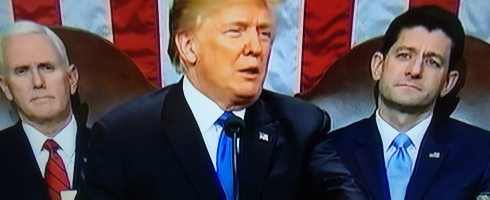With The Mid-Term Elections Over, Mystery Awaits For Both Parties
7 NovTrump Demands Congress to Embrace Immigration Reform in Primetime Speech
31 Jan
In his first State of the Union speech, President Donald Trump sounded more restrained than usual, but no less different in his determination to see major policy changes. That was particularly the case in regards to the long-standing, controversial issue of immigration, a subject that helped him win the presidency but also contributed to the recent, short-lived government shutdown.
In his nearly 90-minute primetime address, which also included the usual laundry list of self-congratulatory accomplishments similar to past speeches from other presidents, Trump eventually touched on the hot-button immigration issue, saying that “glaring loopholes” had led to dangerous undocumented immigrants, including members of the notorious Latino MS-13 gang, to cross the American border, bringing along with them violence and drugs. The president used this example as the rationale to change immigration laws.
“My duty is to defend Americans, to protect their safety and families….because Americans are dreamers, too,” Trump said, appearing to use the word dreamers in a different way than how it’s been used by many Congressional lawmakers.
In the current political lexicon, “dreamers” is the shorthand for children of undocumented immigrants who came to the United States at a very young age and have practically lived much of their whole lives in America, working and going to school here.
Many of these dreamers are facing deportation unless Congress can enact comprehensive immigration reform legislation. That’s because one of the programs that was implemented by former President Barack Obama, the Deferred Action Childhood Arrivals, or DACA, is set to expire shortly. DACA is estimated to be protecting some 800,000 people.
Democrats and some moderate Republicans have been debating legislation and scenarios where many or all of the dreamers, among other young undocumented immigrants, can remain in the states.
Trump last week introduced immigration reform legislation and reiterated it during his speech, describing it as “a down-the middle compromise.” Along with providing a “path to citizenship” to some 1.8 million dreamers over a 12-year period, contingent on them completing various education and work requirements, Trump’s plan also calls for his signature proposal of a full-length wall on the Mexican border, ending the visa lottery program, and accepting more immigrants based on skills and professional qualifications rather than family connections (derisively referred to in some circles as chain migration).
The president said that the present “outdated immigration rules,” particularly the visa lottery program, have outlived their usefulness, and oftentimes counterproductive, given some recent domestic attacks.
“In the age of terrorism, these programs present risk,” Trump said.
He implored Congress to finally pass comprehensive immigration reform, something that last happened some 30 years ago, when Republican President Ronald Reagan signed legislation that provided amnesty to some three million undocumented aliens.
“This Congress can be the one that finally makes it happen…that puts America first,” Trump said.
In presenting a human face on the dangers of immigration laws remaining unchanged, Trump mentioned and introduced a Long Island family whose kids were brutally murdered by MS-13.
“Three-hundred-and-twenty-million hearts are breaking for you,” he said.
Trump then implored Congress to “close the deadly loopholes, fix our immigration laws” and provide more reinforcements to border guards and Immigration and Customs Enforcement (ICE).
While immigration illicited some of the strongest responses from both sides of the aisle, GOP lawmakers enthusiastically applauded the litany of accomplishments that Trump citied.
Among the things Trump mentioned include:
*Creation of 2.4 million new jobs, including 200,000 in the manufacturing sector.
*Passage of the $1.5-trillion Tax Reform and Jobs Act that will yield to bigger paychecks starting in February and has already lead many employers to issue bonuses to employees (no Democrats voted for the bill, citing that it would add considerably to the deficit and federal debt)
*Relocation of corporate funds to the United States, from companies like Apple and Exxon, which enables the federal government to collect tax repatriations;
*Record-low unemployment rates among the African-American and Hispanic populations;
*The up-until-recently red-hot performance of the Stock Market, which has increased the value of many retirement and investment portfolios;
*Deregulation;
*Appointment of conservative judges on Circuit Courts and the U.S. Supreme Court Justice Norman Gorsuch;
Still, Trump pointed out some other areas where he wants to see results. They include:
- a $1.5-trillion infrastructure bill
- Streamlining the permitting process to move forward on construction projects
- More vocational education, workforce development, and job training programs
- Paid Family Leave
In the meantime, Congress faces a Feb. 8 deadline to adopt a budget. If both parties don’t come to an agreement, the federal government could shut down again.
Hillary Clinton starts the quest to presidential nomination with new memior
10 Jun As part of a tour to promote her new memoir, “Hard Choices,” former First Lady and Secretary of State Hillary Clinton — widely seen as the front-runner for the 2016 Democratic Presidential nomination — sat down with ABC News journalist Diane Sawyer in which she defended her record, remained coy about running for the nation’s highest job and one who takes the high road when it comes to adultery and sexist remarks made by world leaders.
As part of a tour to promote her new memoir, “Hard Choices,” former First Lady and Secretary of State Hillary Clinton — widely seen as the front-runner for the 2016 Democratic Presidential nomination — sat down with ABC News journalist Diane Sawyer in which she defended her record, remained coy about running for the nation’s highest job and one who takes the high road when it comes to adultery and sexist remarks made by world leaders.
She also defended her health, which became a major issue after suffering a concussion. Former President George W. Bush’s adviser Karl Rove particularly made a hay out of it, questioning her judgment and linking her poor decision-making, in his opinion anyway, to that injury. Clinton came back with a retort at Rove: “he was called “Bush’s brain…and I wish him well.” While she’s fully recovered, Clinton admitted she has to take blood-thinners daily.
Lately her record – or perhaps lack of – as secretary of state has been scrutinized as one where much had not been accomplished and, if anything, the world is a more unsettled place.
About the one record that was notable and unquestionable was her extensive travel: 1 million miles and 112 nations. But Clinton said there’s far more to her record of accomplishment, such as fighting for tougher sanctions on Iran, which she said had brought them to the proverbial table. Also, she had also called for the strike in a rural Pakistani village that ultimately led to the killing of terrorist mastermind Osama bin Laden. She pointed out that Vice President Joseph Biden and former Defense Secretary Bob Gates opposed going in.
While readily admitting that she hadn’t inspired the creation of some new doctrine, Clton said results for world peace and security rarely are so clear-cut.
“There’s no perfect outcome. It’s a constant effort.”
Benghazi
Perhaps the biggest lightening rod of an issue for Clinton is her handling of the security, or lack thereof, that lead to the deaths of four Americans – including Ambassador Chris Stevens – in the town of Benghazi in Libya, which had just seen its first taste of freedom following the overthrow of longtime dictator Muammar Qaddafi. Republicans have repeatedly questioned her judgment on this issue, especially given that that cables were sent about the month before the Sept. 11, 2012 attack about insufficient security. A subsequent investigation by a federal review board found the security surrounding the outpost to be inadequate, which included an incomplete fence and inoperable security cameras.
At the time, she said she believed she did everything in her power to address the issue, even though she admitted she didn’t personally read the cables regarding the security situation, nor did she plan out the security situation. She said she is not in a position to micromanage security situations, leaving that to others.
“I’m not equipped to look at blueprints,” she said. “I was not making security decisions. The experience and expertise lies elsewhere.” She said it was unfortunate some lawmakers were “politicizing this at the expense of four dead Americans.”
Despite the brutal criticism from many Republicans, at least one Republican has praised her work: Gates himself. In his book, “Duty,” which largely slammed President Barack Obama’s leadership, Gates wrote about Clinton, “I found her smart, idealistic but pragmatic, tough-minded, indefatigable, funny, a very valuable colleague, and a superb representative of the United States all over the world.”
On personal matters, such as former White House intern Monica Lewinsky, who had an affair with the former president in the late 1990s, and a sexist remark Russia’s President Vladimir Putin made about her after she compared him to Hitler (“Better to not argue with a woman”), Clinton decided to take the high road. About Lewinsky, she said she wishes her well, and about Putin, there’s agreement to disagree.